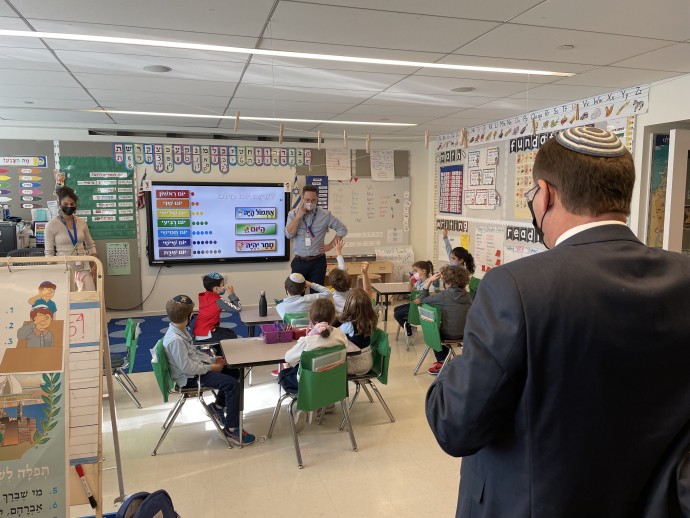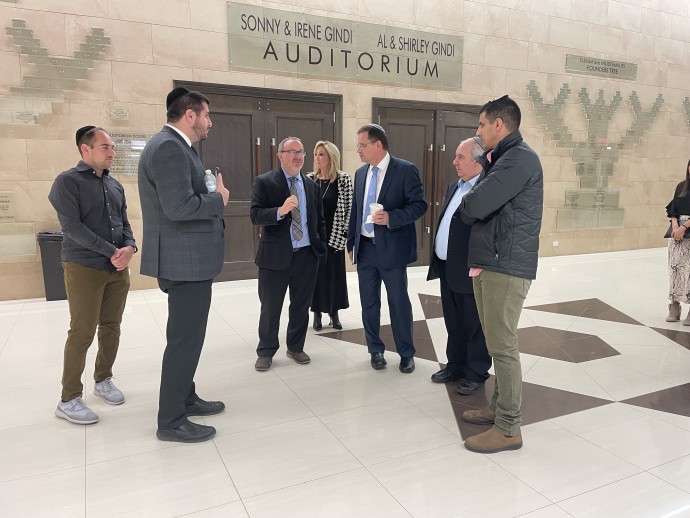‘The State of Israel must change its approach,” says Gael Grunewald, deputy chairman of the World Zionist Organization and head of its Department of Education.
“In the past, Israel expected that the Jews of the Diaspora would help Israel. The time has come to change this paradigm. Today, Israel is strong, and now we must support the Diaspora.”
Israel can assist Jewish communities outside the country, Grunewald explains, by educating and inspiring young Jews in the face of assimilation and antisemitism.
As head of the Department of Education at the WZO, he is uniquely positioned to provide that support. Grunewald supervises the work of the 200 shlihim (emissaries) from the organization who are sent to teach at Jewish schools throughout the world and act as informal ambassadors for the State of Israel.
Jewish schools outside Israel turn to the WZO for teaching assistance, he explains, because they want to bring the vibrant spirit of the Land of Israel to their schools. They realize that in order accomplish this, they need to bring educators from Israel.
“The shlihim teach Judaism and Hebrew language,” says Grunewald, “and they have a tremendous influence outside the classroom. The teachers are considered ‘Mr. Israel’ in their schools and communities. They represent Israel to the school’s entire educational system – students, teachers and parents. They represent the best of Israel.”
He adds that the other Judaic studies teachers in the schools where they serve often turn to them for assistance and advice, and families considering aliyah consult with them for practical advice.
Grunewald himself epitomizes the positive effect that shlihim can make. Born in Strasbourg, France, he recalls the influence of shlihim on his life. “I remember the very first time I met a shaliah and the first time I met an Israeli family. It had a great influence on me and my decision to make aliyah.”
While shlihim do not have formal responsibilities outside the educational framework of the school they serve,
Grunewald says that many assume duties in the Jewish community during their stay. “I met one shaliah in New Jersey who spent evenings teaching Israeli children who did not attend Jewish schools. Some shlihim work with the local Jewish youth organizations, some teach Daf Yomi (the daily Talmud page) in the community, and others teach in Sunday schools.”

Grunewald emphasizes that working as a shaliah is not an opportunity for visiting Israelis to spend their time shopping. “I always emphasize the fact the shaliah must go with a feeling that he is going to work hard and will be on a mission. It’s not just a job.”
When it comes to countering assimilation, Grunewald says that students will have difficulty countering anti-Jewish and anti-Israel rhetoric if they have not absorbed important Jewish ideas and education during their primary and high school studies.
“The more tools we give the youth who are in contact with the shlihim,” he says, “the better they will be equipped with the tools they need when they enter university. One of the main reasons we send shlihim is to counter assimilation.”
While the WZO sends the vast majority of its shlihim to the United States, the organization sends emissaries to other countries and regions throughout North America, South America and Europe, including Canada, Mexico, Chile, Argentina, Romania, Hungary, Spain, Scandinavia, Germany, Belgium, Greece, Switzerland, England, Italy and France.
Grunewald notes that the emissaries sent by the WZO come from a wide variety of Jewish backgrounds. Some are Orthodox, while others come from secular backgrounds. Shlihim teach in schools that span the spectrum of Jewish observance – Orthodox, Conservative and Reform.
“We try to respond to all of the different communities in the US and around the world,” says Grunewald.
Becoming a shaliah, he says, requires a great deal of motivation and a desire to assist and develop the Jewish community.
Shlihim must possess a love of the Land of Israel and want to share that feeling with others, he says. Grunewald quips that the people best suited for shlihut are those who love the land and don’t want to leave the country. “I look for shlihim who don’t want to leave Israel. Those who want to go that badly should stay here. Otherwise, I am afraid that they will not return.”
Apart from looking for the highly motivated, he adds, “I am looking for shlihim who are proficient in teaching, and who can connect to youth. I am looking for educators.”
A high percentage of the shlihim whom the WZO sends, Grunewald says, are couples who both work in the educational system during their stay.
The WZO trains its emissaries before they embark on their journeys and provides support and training throughout their stay, which usually varies between two and four years. Training begins with instruction in teaching Hebrew and Jewish studies before they depart and lasts throughout their time abroad, with continuing education seminars given via Zoom.

In addition, the WZO periodically organizes larger conferences of shlihim abroad. This past November, the WZO held a conference in the United States for shlihim in the US, Canada and Mexico. In several weeks, another conference will be held in Europe, where shlihim serving on the European continent will discuss the current situations in the communities where they serve and will receive guidance from WZO experts.
“We hear what they are experiencing,” says Grunewald, and we give them the tools to analyze what they are going through.”
He says that, like dedicated soldiers, they experience their ups and downs and need encouragement and motivation from time to time.
Grunewald reports that WZO shlihim are attuned to events in Israel and are trained to respond to events as they occur. “Students come to class, and they repeat the anti-Israel comments that they hear on the street and in the media or at home. The shaliah has to answer.”
During the IDF’s Operation Guardian of the Walls, in May 2021, when Hamas and Palestinian Islamic Jihad fired almost 4,400 rockets at Israel, shlihim were briefed on the security situation by Foreign Ministry staff and IDF representatives in order to help them answer questions from their students.
Grunewald points out that the shlihim were frequently queried about Israel’s position in synagogues and at Shabbat meals.
“You must prepare them properly with the educational tools so that they will have answers for all of their questions,” he says.
The education that shlihim receive extends to the makeup and structure of the Jewish community as well, notes Grunewald. Shlihim in very large communities such as New York may not be exposed to the community systems and Jewish Federations, but those in smaller cities such as Cleveland, Detroit and Milwaukee get a close-up look at the makeup of the entire Jewish community during their service.

When shlihim return to Israel, Grunewald says, they frequently maintain a connection with their students.
“Some continue to teach, after they come back, via Zoom,” he says, and adds that many shlihim host their former students for Shabbatot when they are in Israel for their gap year studies.
While Grunewald speaks forcefully about the need for Israel to give back to the Jewish communities of the Diaspora, he says that the WZO needs more Israelis who are willing to leave Israel for posting as educational emissaries.
“We don’t have enough shlihim. I am afraid that we will have more requests from schools for shlihim and not be able to meet their requests. Israelis need to understand the importance of the Jewish community in the Diaspora,” he says.
“We must speak to our children. Just as we rally them to the flag of the IDF, the flag of kindness, and settling the land, we must rally them to the flag of helping the Jews in the Diaspora. It is not emphasized enough.”
This article was written in cooperation with the World Zionist Organization.
